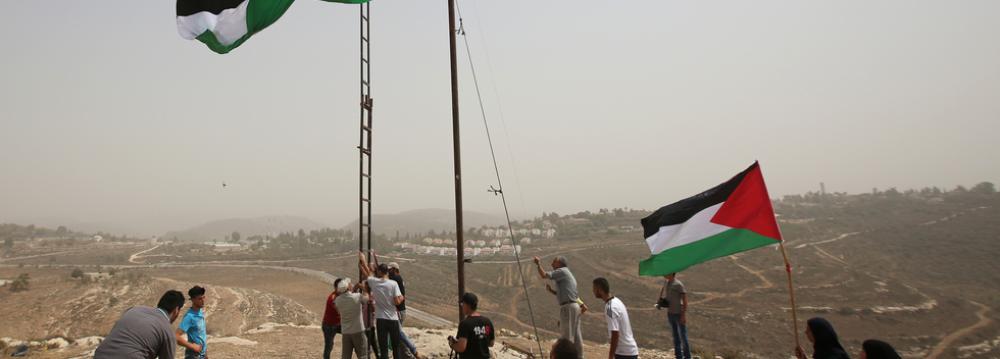There is little debate that last week’s UN vote to raise the Palestinian flag at its headquarters and offices was anything other than symbolic–the Palestinian representative to the UN himself described it as such. However, that does not make the move insignificant.
The UN General Assembly vote was yet another display of the strength of international sympathy with the Palestinian cause.
There were 119 votes in favor, 45 abstentions and only eight against, including four tiny island states (the Marshall Islands, Micronesia, Palau and Tuvalu) with a combined population of around 187,000, Sharif Nashashibi wrote for Middle East Eye.
The move was also another sign of Israel’s inability to reverse Palestine’s increasing international footprint. Had this latest vote meant nothing, Israel would not have campaigned against it and reacted angrily afterwards, as its ambassador to the UN had asked the secretary-general and the General Assembly president to block the move.
Despite its well-oiled propaganda machinery, formidable lobby groups and alliance with the USA, this is another indication that Israel is losing the PR war internationally.
The vote also highlighted, once again, the gap between world opinion as reflected in the General Assembly, and the woefully undemocratic Security Council, where the US veto is so often wielded or threatened in aid of Israeli impunity.
Strategies
The vote is “consistent with that overall move toward legitimating a Palestinian state as a reality in international political life,” said Richard Falk, a former UN special rapporteur on human rights in Palestine, and professor emeritus of international law at Princeton University.
In 2011, Palestine joined the UN Educational, Scientific and Cultural Organization as a full member. The following year, its UN status was upgraded to non-member observer “state” rather than “entity”. In April of this year, Palestine formally became a member of the International Criminal Court.
An increasing number of countries are officially recognising Palestine–almost three-quarters of UN members already do, representing some 80 percent of the world population. Parliaments in Europe, Israel’s largest trading partner, are overwhelmingly voting to urge their governments to follow suit.
Such moves can be partly explained by the Palestinian cause adapting to changing circumstances, shifting pressure on Israel to the international stage because the latter has made it increasingly difficult to challenge its occupation and colonization of Palestine on the ground.
However, symbolic triumphs such as the latest General Assembly vote do not go far enough; solidarity in the General Assembly is nothing new, but has not won Palestinians their rights.
What is needed are concrete measures on the ground, and more support for other forms of pressure, primarily the international Boycott, Divestment and Sanctions movement, which is proving increasingly effective.
Measures on the ground should include intra-Palestinian reconciliation, a boycott of Israeli products, and cutting security ties with Israel. Such measures are widely popular among Palestinians, and were adopted in March this year by the Palestine Liberation Organization, whose decisions are supposed to be binding on the Palestinian Authority.
Concerns
However, the PA has yet to implement them, raising doubts as to whether it plans to at all. Indeed, last year PA President Mahmoud Abbas described “security” coordination with Israel as “sacred,” and said in 2013, “We do not support the boycott of Israel. We don’t ask anyone to boycott Israel.”
Concerns have been heightened over Abbas’s resignation last month as head of the PLO Executive Committee–as well as another 10 of its 18 members–and his call for an emergency meeting of the Palestine National Council to elect new members.
While he has framed this as an effort to reform the PLO, there are suspicions–even among members of his own Fatah party–that this is a power play designed to fill the executive committee with more of his supporters.
Such suspicions are not unfounded given the increasingly autocratic rule of Abbas who remains PA president despite his term having ended in 2009.
He recently sacked vocal critic Yasser Abed-Rabbo as PLO secretary-general and replaced him with Saeb Erekat, a long-time and close aide. Former PA prime minister Salam Fayyad resigned in 2013 amid differences with Abbas. Meanwhile, Palestinian and international human rights groups condemn the PA’s continued crackdown on dissent.
Priorities
Symbolic triumphs, such as various forms of recognition of Palestine, hurt Israel from a PR perspective. However, the aforementioned measures would hit it where it really hurts: its economy and occupation.
Palestine is acquiring the symbolic trappings of a state, but moving further away from its actual establishment as Israel’s occupation and colonization become ever-more entrenched.
This may benefit Israel if the focus remains more on the former rather than on the latter; in other words, the illusion of a state, and celebration over symbolic victories, may deflect from the need for that state to be a fact on the ground.
After all, what use are things such as passports, flags, embassies, stamps, dialing codes and Internet domains when the state itself exists only on paper? And what use is a leadership that cannot, or will not, move beyond symbolism?


